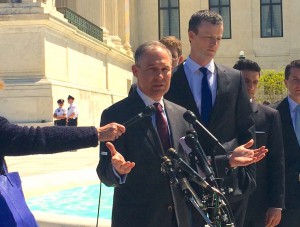
New EPA Administrator Scott Pruitt is considering eliminating California's special exemption to following federal emissions rules.
It appears that the State of California and the Trump Administration are on a collision course and the point of impact may be the oft-debated emissions rules that are now up for debate.
Led by the California Air Resources Board (CARB), the Golden State is moving ahead with more stringent car pollution rules for 2022-2025, which were approved by Obama administration just before the Trump camp took over in January.
California regulators are expected to finalize the rules at a meeting next week. However, the federal rules are expected to be eased. Trump announced the review of the corporate average fuel economy standards as well as the emissions standards will be reopened, much to the delight of automakers.
Environmental Protection Agency Administrator (EPA) Scott Pruitt, long a climate change skeptic, said reiterated that the agency will review the federal rules. Pruitt is widely expected to loosen the restrictions.
(Trump announces CAFE rule review will be reopened. Click Here for the story.)
And this is where the clash occurs and the problems begin, especially for automakers. There are a single set of rules that automakers must abide by when it comes to the emission standard, which are the same for all states — except California.
The state was granted a special exemption to create its own emissions rules years ago to allow state officials combat poor air quality due to pollution caused by cars and trucks. California generally leads the rest of the country when it comes to air quality requirements.
If California sticks to its tougher standards as the EPA relaxes the rules for the rest of the country, automakers will find themselves in a quandary. For now, CARB is talking tough.
“We are not backing down,” Hector De La Torre, a CARB member, told Reuters. According to Reuters, a majority of CARB members support for the original plan worked out by the federal government, carmakers and California during Obama’s presidency.
(Auto CEOs ask Trump for a CAFE break. Click Here for the details.)
That plan includes stricter tailpipe emissions targets and a state mandate for zero-emissions cars. The tougher rules were expected to add about $1,000 to cost of a new vehicle in 2025.
From the start of his appointment to head the agency he often sued during his tenure as the Attorney General of Oklahoma, he’s suggested he could seek to end California’s exemption from falling in line with federal regulations, which is in place until 2025.
Ironically, now that Pruitt is in charge of the EPA, he’s finding himself at the other end of the legal gun barrel. California Gov. Jerry Brown called the move to reopen the review, “an conscionable gift for polluters,” adding that his state will launch a lawsuit, along with New York, challenging the re-opening of the review.
“If they succeed, we’ll pay more at the pump, depend more on oil from bad countries, drive up the trade deficit and pollute our kids,” said Dan Becker, director of the Safe Climate Campaign.
One reason why all makers, Detroit, European or Asian, may find it difficult to make major shifts in their strategies is the fact that they all operate on a global scale. With a few exceptions, notably their big pickups, automakers design their vehicles to be sold around the world.
(For more on the EPA’s mileage decision, Click Here.)
And so, said Nissan’s Ghosn, even if the U.S. rolls back CAFE, the likelihood is for even tougher emissions standards in other key markets, such as Europe, Japan and China. “We’re going to have to keep an eye” on those rules, and develop vehicles accordingly, he said, no matter what happens in the U.S.

CARB was created before the EPA by about a year. State trumps federal.
Soot, soot let’s pollute